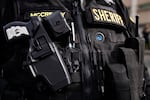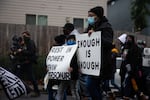After two years of analysis, policy discussions, negotiations and a dedicated task force, the Vancouver Police Department is getting body cameras.
The city and police union announced an agreement this week on the policies that will govern how the cameras will be used.
Those policies are typically the thorniest part of implementing a body-worn camera program. They determine important guidelines like when an officer will be required to activate their camera, when they are allowed to view their own footage, and when the public will be allowed to see footage.

Washington County Sheriffs Deputy Jarrod McCreary is seen wearing the department's new body camera system on March 8, 2021, in Hillsboro, Oregon.
Jonathan Levinson / OPB
Demands for more law enforcement accountability in Southwest Washington have grown in recent years. In the span of two months in 2019, Vancouver police shot four people, killing three of them. And Clark County Sheriff’s Office deputies killed two people last year, Jenoah Donald and Kevin Peterson, Jr. Peterson was shot while running away from police during a drug bust and Donald was unarmed and shot during a traffic stop.
Clark County leaders approved a body camera program for the Sheriff’s Office earlier this year.
“What we are seeing is disproportionate policing, disproportionate use of force,” Shareefah Hoover, a member of the city’s Community Task Force on Policing told OPB in March. “We have a pattern here of Black men, who are a very small percentage of the Clark County population, having their lives taken at a much higher rate than the general population.”
Hoover said at the time that she was pushing for policies that have meaningful consequences for violations. The policy released this week doesn’t discuss discipline or consequences for officers failing to activate a camera except to say there will be a one-month or 16-shift amnesty period once the cameras are issued.
The body camera policies Vancouver police are adopting frustrate police accountability advocates who were hoping the body cameras would lead to meaningful oversight.
Officers involved in a use of force incident will be allowed to view body camera footage prior to making a statement or writing their report, something police unions have typically advocated. The policy is in line with the recommendations put forward by the Police Executive Research Forum, an outside group Vancouver hired to make use of force policy recommendations.
That policy contradicts recommendations U.S. Department of Justice civil rights lawyers have made around body cameras. Federal prosecutors overseeing police reforms in Portland are urging city officials to adopt policies barring the practice, requiring officers to write their reports first, then allowing them to amend their report after viewing the footage, if necessary.
“That’s not your individual subjective recollection of what happened,” said Jonas Geissler, a senior trial attorney at the DOJ’s civil rights division, while discussing recommendations for Portland police. “It really undermines the objective nature which is the constitutional test for uses of force: the threat, severity, and resistance encountered by the officer at the time force was used.”

Kevin Peterson Sr., gray hoodie, leads a march Dec. 6, 2020 to protest his son's death by police weeks prior. Peterson Jr. died after three officers shot him during a botched drug bust outside Vancouver.
Troy Brynelson / OPB
The policies were disappointing for the community members who spent the past year working with city officials as they dissected the 84 recommendations made by the Police Executive Research Forum.
“The goal of putting a body camera on an officer was only a portion of our desire,” said Ed Hamilton Rosales, a member of Vancouver’s Community Task Force on Policing and the president of the Southwest Washington Council for the League of United Latin American Citizens. “If there’s no accountability to the police officer for actions he takes beyond those cameras, then we’ve just spent a lot of money on a piece of equipment that does us no good.”
Hamilton Rosales said when the task force asked Vancouver Police Chief James McElvain what consequences officers will face for violating the policy, McElvain told them that would not be an issue.
“The police chief’s response was, ‘My officers know if it’s a policy, they’ll do it,’” Hamilton Rosales said. “Which we all know is a lie.”
Footage from Vancouver officers will be available to the public through records requests, according to the memorandum of understanding signed by the city and police union. There are protections in place for footage to be redacted in the case of sexual assault, domestic violence and other vulnerable victims, as well as for people experiencing mental health crises or medical emergencies.
“I feel like I’ve wasted a year of my time hoping for something that is never going to occur,” Hamilton Rosales said.
Research on body cameras has shown they have mixed results for reducing negative policing outcomes. In departments with a history of questionable use of force practices and other discipline problems, body cameras can lead to dramatic reductions in force used and complaints from the public.
In less troubled departments, their impact can be negligible.
As part of the agreement for the cameras, officers will also get a raise “to address the impacts of implementation of the Police Camera Program and the midterm change in working conditions.” Prior to settling on these policies, officers were slated to receive a 3% pay increase on Jan. 1, 2022. Now, their pay will go up 5%. Sergeants who were initially going to get a 4% increase will now receive a 6% increase.
Vancouver has budgeted $3 million for the body camera program and is expected to receive $1.5 million in federal funding. The program is expected to launch in the first quarter of 2022.
